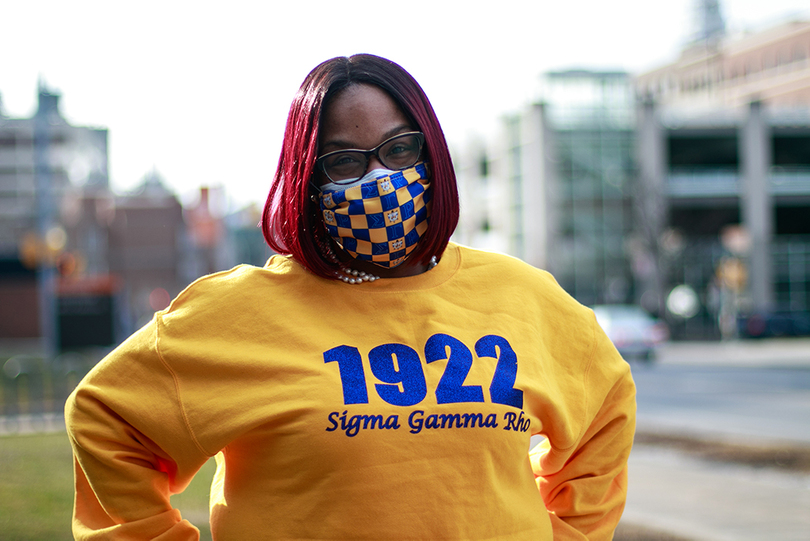Local organizations work to reduce racial inequality in vaccine rollout

Local organizations like the National Black Leadership Commission on Health are working to educate Black people about the vaccine. Elizabeth Billman | Senior Staff Photographer
Get the latest Syracuse news delivered right to your inbox.
Subscribe to our newsletter here.
As New York state continues its rollout of the COVID-19 vaccine, more people are becoming eligible to receive it. But in Onondaga County, like many places across the country, vaccine distribution hasn’t been racially equitable — and several local organizations are working to change that.
During a Feb. 22 press briefing, Onondaga County Executive Ryan McMahon announced that almost 85,000 county residents had received at least one dose of the vaccine. An overwhelming majority of these doses — 84%— have gone to white residents, while the county’s Black population has received only about 7% of the vaccines, he said.
McMahon acknowledged during the briefing that the current rate of vaccine distribution to Black communities is falling short.
“Certainly, we’ve got a little bit of work to do,” he said.
Denise Welch, the associate program manager for the Syracuse branch of the National Black Leadership Commission on Health, has been addressing racial disparities since the pandemic first hit the city last March. Welch and Marlo Judge, the organization’s senior outreach specialist, shifted the organization’s focus to ensuring that Black residents had access to essential COVID-19 supplies, such as masks, hand sanitizer and informational brochures about the virus.
“Our goal at first was to get to the underprivileged areas to provide them with COVID materials,” Judge said. “Outreach is very important. We’re going to where they are, instead of them having them try to reach us.”
When vaccine doses started reaching the county, Welch knew it would be important to ensure the Black community in Syracuse felt comfortable getting it. She noticed that many people were wary of the vaccine, whether due to fear that the vaccine was developed too quickly or distrust stemming from systemic medical abuses against people of color, she said.
To try to relieve these fears and restore people’s trust in the vaccine, Welch’s organization collaborated with Syracuse Mayor Ben Walsh to host a virtual town hall. Several local doctors spoke about the vaccine and dispelled rumors and misinformation surrounding its rollout.
Residents had so many questions that the organization decided to schedule a follow-up town hall in early March, Welch said. Answering questions and educating residents about the vaccine is the first step in getting more Black residents vaccinated, she said.
“The numbers are very low right now for our African American population here in Syracuse,” she said. “A lot of (getting people vaccinated) is going to come from education dispelling myths and misconceptions about the vaccine.”
Supporting Syracuse’s Black population and educating residents about the COVID-19 vaccine has also been the mission of Dr. Sharon Brangman, a professor and chair of the geriatrics department at SUNY Upstate Medical University. Over the past several weeks, she has reached out to organizations in the Black community — including the People’s AME Zion Church and the 100 Black Men of Syracuse — to hold virtual events where she addresses people’s questions and concerns surrounding the vaccine.
Like Welch, she has found that misinformation and conspiracy theories about the vaccine’s quick development, as well as long-standing medical neglect of Black people across the U.S., have made many Black Syracuse residents apprehensive.
Black Americans have long experienced trauma at the hands of medical professionals in the past, including experimentation on enslaved Africans, eugenics and sterilization. Between 1932 and 1972, the Centers for Disease Control and Prevention conducted a psychological experiment, known as the Tuskegee Syphilis study, which resulted in the death of 128 participants, who were all Black.
“Everybody likes to talk about the Tuskegee study — which was horrible — but I run into people all the time who have real-time issues that are valid and concerning with the health care system,” Brangman said.
This distrust of the vaccine even extends to some health care workers in Syracuse. The Syracuse chapter of the American Heart Association held a virtual Q&A panel where four Black women who have been fully vaccinated against COVID-19 shared their experience with the vaccine. All four women, including two nurses at Upstate University Hospital, said they were hesitant to receive the vaccine because of systemic anti-Black racism in American medicine and rapid development of the vaccine.
Quonitra Bullock, a registered nurse at Upstate University Hospital, said she spent several sleepless nights debating whether to get vaccinated. But her fears about the vaccine’s potential side effects were outweighed by the “civic responsibility” she felt as a frontline health care worker to get vaccinated, as well as her desire to reduce the threat of spreading the virus to her family, she said.
“I have not fully been able to embrace my family in a little over a year,” Bullock said. “I want to one day be able to hug my family members … I have a responsibility to them to do whatever is necessary to keep everyone healthy.”
In recent weeks, Onondaga County has been working to vaccinate more of the county’s Black population through outreach efforts, like “pop-up” clinics at community organizations. But continued public education is essential to actually get those vaccines into the arms of Black people, Brangman said.
“We have to counter all those conspiracies and bad information that’s so ubiquitous on social media,” she said. “When people get information from a trusted source, the majority of people I’ve interacted with make the decision to get the vaccine.”





